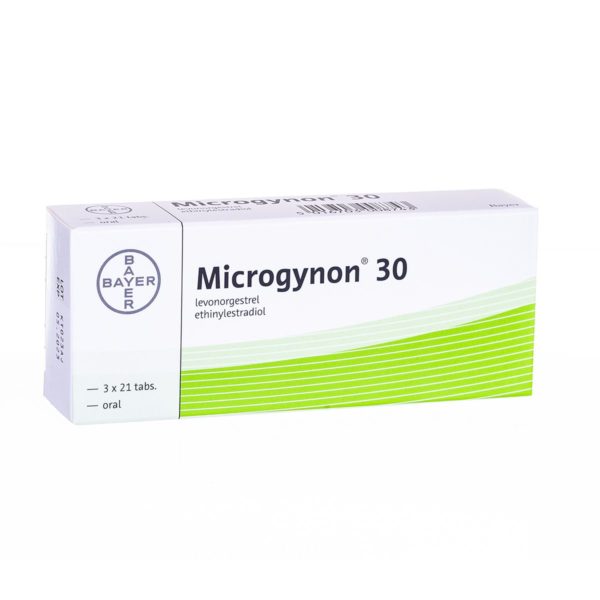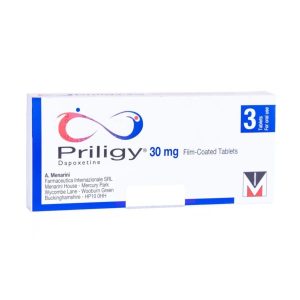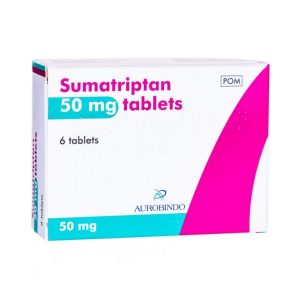Microgynon 30 Contraceptive Pill
- Safe & Discreet Available 24/7
- Fully inspected and regulated service
Buy Microgynon 30 Online UK
My Chemist Plus offers the best place to buy Microgynon 30mg with next day delivery available within the UK. To purchase Microgynon, you will need a prescription, which is available through our free online consultation service. Each item you purchase will sent via secure and discreet packaging to ensure that you receive your medicine in a complete and efficient manner.
What is Microgynon 30?
Microgynon Pill (or Microgynon30) is a prescription medicine used for the prevention of becoming pregnant and contains two types of female sex hormones- oestrogen and progestogen. These hormones contained can stop a pregnancy from happening.
This includes the following ways:
- Eggs are no longer released from the ovaries
- Fluid/mucus in your cervix becomes thicker, making it more difficult for the sperm to reach and enter the womb
- Thickening of the womb occurs, not allowing enough space for an egg to grow.
Microgynon is a 21- day course of treatment, taken once a day followed by a break of 7 days.
Contraceptive Pill Microgynon
When a man’s sperms reach a woman’s egg, the woman will become pregnant, but contraception is an artificial way of stopping this happening.
This is achieved by:
- The egg and sperm being kept apart
- Halting egg production
- The egg and sperm can no longer attach to the lining of the womb.
For most people within the UK, contraception is free, and condoms are available at most pharmacies and supermarkets. Microgynon is one option for female contraception.
Is Microgynon a Combined Pill?
The combined pill is another term for the pill, with the combined pill containing two artificial versions of the female hormones oestrogen and progesterone which are produced naturally in the ovaries. Microgynon contains both hormones and is classed as a combined pill.
Before taking a combined pill, there are some important factors to know.
These include:
- It is one of the most reliable contraception’s to prevent pregnancy- when used correctly
- One of the risks taking a combined pill includes the possibility of a blood clot
- Long-term it can reduce the risk of ovarian and womb cancer
How to Take Microgynon
When you are prescribed Microgynon, you should familiarise yourself with how to take the medication
You should always take Microgynon Contraceptive Pill following the guidance below:
- Take Microgynon 30 every day for 21 days, naturally concluding the course
- Each packet of Microgynon contraceptive pill has strips of 21 pills- these are marked with a specified day
- Ensure that you take the pill at the same time, every day
- You should begin the course by taking one marked with the correct current day of the week
- Eachstrip will have arrows guiding you to the next contraceptive pill, taking one each day until the course is finished
- Each pill should be swallowed whole (not chewed) – taken with water if needed
- Once the course is finished, have 7 days of pill-free days.
After taking the course of pills in the strip you must have 7 days without taking any pills- for example if your last pill is taken on a Friday, the first pill from the next pack will be taken on the Saturday the following week.
Microgynon Missed Pill or Period
If any of the pills in the strip are missed and you do not bleed within the first pill free week, there is a possibility of pregnancy. If you believe you may be pregnant, please contact your doctor or take a home pregnancy test. A Microgynon missed pill or missed period can indicate that your birth control is no longer effective. In this situation you will have to consider using emergency contraception.
Microgynon Missed Period
You may experience a missed withdrawal bleed which could indicate a pregnancy however it is very unlikely if the pills have been taken correctly. The next strip should be taken at the recommended time.
If you feel you may be at risk of pregnancy, the best course of action is to take a pregnancy test. If this is positive, please consult your doctor.
Microgynon Side Effects
As with any medication side effects can occur when taking Microgynon but these do not affect everyone. If you experience any of the side effects, or these become severe or persistent, please consult your doctor.
Below is a list of the most serious side effects – if you experience any of these, please consult your doctor straight away.
- Blood clots in a vein or artery (in legs, feet, lungs, heart and brain.)
- Severe allergic reactions such as swelling of the hands, face, lips, mouth, tongue or throat
- Signs of breast cancer, skin dimpling on the breast, changes in the nipples, any lumps that are protruding or felt
- Cervix cancer, including vaginal discharge, unusual vaginal bleeding, pelvic pain and painful sex
Common side effects include:
- Being sick and/or stomach ache
- An increase in fluid retention
- Migraines
- Loss of sexual drive (no interest)
- Enlargement of the breast
- Rashes on the skin, which may or may not be itchy.
Further information and help can be sought from Microgynon Contraceptive Pill patient leaflet.
Microgynon Acne
Acne is not a known side effect of taking Microgynon 30 as contraceptive pills are not usually a cause for acne and can often be effective at preventing it in the long term.
If you have just begun on a new form of oral contraception and have noticed a sudden outbreak of acne, it is unlikely that birth control is the cause. It is often the result of hormone fluctuation which is a normal reaction.
Rigevidon and Microgynon
Microgynon and Rigevidon are two of most common types of contraceptive pills with both containing the same ingredients of oestrogen and progesterone. The two pills are effectively the same medication however Rigevidon contains different non-active ingredients such as colourings and is the cheaper of the two.
Microgynon 30 Alternatives
Microgynon pill has many alternatives/ alternative names- all of these contain Ethinylestradiol 30mgs & Levonorgestrel 150mgs
These include:
- Levest
- Ovranette
- Rigevidon
- Microgynon 30 ED (Includes a week of placebo tablets, helps with people who are more likely to forget to take the daily pill.)
Other alternative contraception methods include:
- Cerazette Mini Pill (Desogestrel)
- Desogestrel (Generic Cerazette) Mini-Pill
- Yasmin Contraceptive Pill
- Cilest Pills
Combined Oral Contraceptive
The combined pill is another term for the pill, with the combined pill containing two artificial versions of the female hormones oestrogen and progesterone which are produced naturally in the ovaries. The combined pill as a prevention of becoming pregnant is effective by 99%.
The recommended way to use the pill is to take one every day for 21 days then have a break for 7 days, during which time you should have a period. After 7 days you begin to take the pill again.
It is advised to take the pill at the same time every day to form a routine, otherwise there is a risk of pregnancy, particularly if you miss a pill or vomit or have severe diarrhoea.
Please note that some medicines can affect the efficiency of the pill so you should consult your doctor before taking any other tablets.
If you suffer from heavy or painful periods, PMS (premenstrual syndrome) or endometriosis the combined pill can be an effective medication to help ease your symptoms.
Please note that the pill does not protect against sexually transmitted infections (STIs) so you would require a condom to protect against this.
How the combined pill works
- It prevents the ovaries from releasing an egg each month (ovulation)
- It thickens the mucus in the neck of the womb, so it is harder for sperm to penetrate the womb and reach an egg
- It thins the lining of the womb, so there is less chance of a fertilised egg implanting into the womb and being able to grow
There are a variety of brands of pill- these are made up of three main types:
Monophasic 21-day pills
The most common type of pill which has the same amount of hormone in it. One pill is taken every day for 21 days and then a break of 7 days. Microgynon, Marvelon, Yasmin and Cilest are all examples of this type of pill.
Phasic 21-day pills
Phasic pills contain two to three sections of different coloured pills within a pack with each section containing a different level of hormones. One pill is taken every day for 21 days and then a break of 7 days. It is important that Phasic pills are taken in the right order. Logynon is an example of this type of pill.
Every day (ED) pills
With ED pills there are 21 active pills and 7 inactive (dummy) pills within each pack. The two types of pills have a different appearance with one pill taken every day for 28 days with no break between the packets. It is important that the everyday pills are taken in the right order. Microgynon ED is an example of this type of pill.
Please ensure that you follow the instructions that come with your packet. If you have any questions you should consult your GP, practice nurse or pharmacist.
What to do if you miss a pill through sickness
If you miss a pill due to being sick, you should use another form of contraception until you have taken the pill again for 7 days without vomiting
Who can use the combined pill
If there are medical restrictions why you cannot take the pill and you are a non-smoker, you can take the pill until the menopause. However, the pill is not the most suitable method of contraception, so you should consult your doctor, nurse or pharmacist to see if this is right for you.
You should not take the pill if you:
- are pregnant
- smoke and are 35 or older
- stopped smoking less than a year ago and are 35 or older
- are very overweight
- take certain medicines (ask your GP or a health professional at a contraception clinic about this)
You should also not take the pill if you have (or have had):
- thrombosis (a blood clot) in a vein, for example in your leg or lungs
- a stroke or any other disease that narrows the arteries
- anyone in your close family having a blood clot under the age of 45
- a heart abnormality or heart disease, including high blood pressure
- severe migraines, especially with aura (warning symptoms)
- breast cancer
- disease of the gallbladder or liver
- diabetes with complications or diabetes for the past 20 years
Risks of taking the combined pill
There are some risks associated with the combined contraceptive pill however these are minimal and for most women, the benefits the pill can provide outweigh the risks.
These risks include:
- Blood clots- The oestrogen in the pill may cause your blood to clot more readily. If a blood clot develops, it could causedeep vein thrombosis (clot in your leg) or pulmonary embolus (clot in your lung)
- stroke
- heart attack
The chances of developing a blood clot is very minimal but your doctor will check if you have certain factors that could put you at risk before they prescribe the pill.
The pill can still be taken with caution if you are identified with a risk factor but is unlikely to be prescribed if you have two or more risk factors
These include:
- being 35 years old or over
- being a smoker or having quit smoking in the past year
- being very overweight (in women with a BMI of 35 or over, the risks of using the pill usually outweigh the benefits)
- having migraines (you should not take the pill if you have severe or regular migraine attacks, especially if you get aura or a warning sign before an attack)
- having high blood pressure
- having had a blood clot or stroke in the past
- having a close relative who had a blood clot when they were younger than 45
- being immobile for a long time – for example, in a wheelchair or with a leg in plaster
- Cancer
There is ongoing research between the link to breast cancer and the pill, it is suggested that users of all types of hormonal contraception have a slightly higher chance of being diagnosed with breast cancer compared to those that don’t use them. However, 10 years after you stop taking the pill, your risk of breast cancer goes back to normal.
Research has also suggested a link between the pill and the risk of developing cervical cancer and a rare form of liver cancer. However, the pill does offer some protection against developing womb (endometrial) cancer, ovarian cancer and colon cancer.











